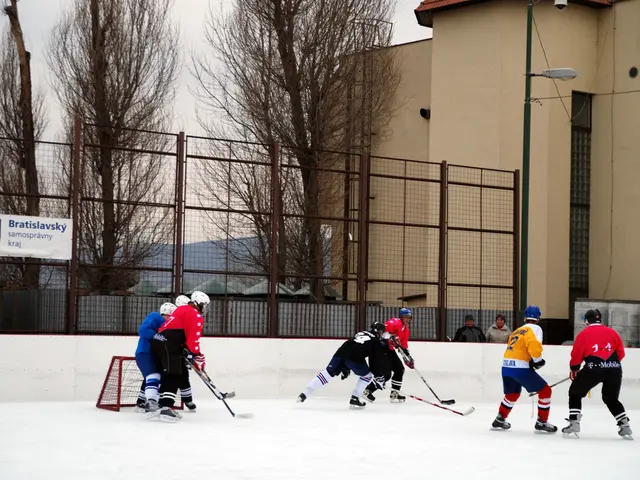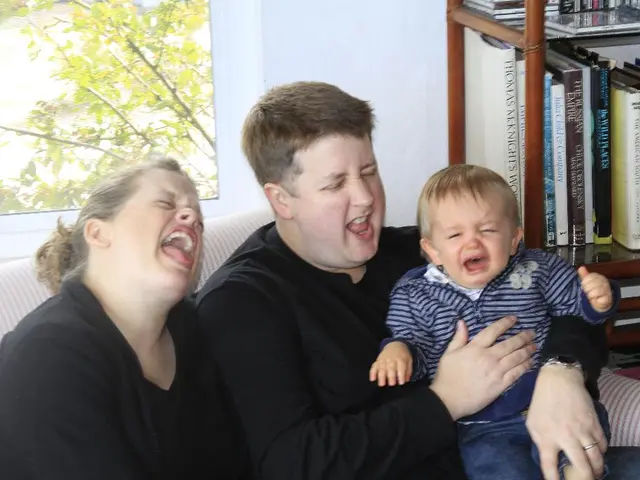Anxieties Run High: Is a Third World War Inevitable in the Near Future? Let's Talk About It
- Penning by Patrick Rösing
- +(Approximately) 6 Minreads
Prediction Indicates High Likelihood of a Future Global Conflict Among Many Respondents - Prediction Survey Reveals Widespread Belief in Inevitability of World War III
May 8, 1945, marked the end of World War II in Europe, and eight decades have passed since then. This day stands as a symbol of liberation from oppression. Looking back, a recent survey by YouGov sought to understand how citizens in six regions view the past and the future, particularly the likelihood of another global conflict.
Worries Loom Over a Third World War
In all countries, a notable portion of respondents consider a Third World War to be a distinct possibility within the next five to ten years. The highest concern was observed in France, with 55% of respondents expressing major worries. Comparatively, Germany registered lower concern, with less than half sharing the same concerns.
The survey also revealed that participants are particularly concerned about the escalating tensions with Russia, seen as a threat to European peace by 78% on average, followed closely by Islamic terrorism at 72%. In Germany, 55% of respondents cited tensions with the USA as a potential risk to peace, as well.
Trusting in the Bundeswehr's abilities
When it comes to defending their nations, Germans are not overly optimistic about the Bundeswehr's capabilities. A majority believe that the Bundeswehr would struggle to effectively safeguard their country in a conflict, with a relatively higher proportion of SPD supporters showing optimism, and AfD and BSW supporters expressing the least trust.
Responding to Conflict
Largely, respondents said their country should come to the aid of a European NATO partner under attack, with an average of 57% agreeing. This percentage was higher in Germany, at 65%, demonstrating a strong sense of solidarity.
Could Similar atrocities happen again?
YouGov also asked whether respondents believed similar events as those seen during the Nazi era could recur in their lifetime. Most Europeans expressed faith that this would not happen, while a greater skepticism was observed among Germans. The general consensus held that such occurrences would be less likely in Germany but more likely in the USA and another Western European country.
Looking Back: World War II and its Aftermath
Responses to YouGov's survey varied widely regarding the involvement of different countries in World War II. In countries like the USA, UK, and France, which were part of the Allies, support for their military involvement outweighed criticism. In former Axis powers like Germany and Italy, the consensus leaned toward disapproval, although 70% of Germans thought their country's war involvement was wrong.
Tributes to the Victories of WWII
Respondents were asked which country played the most significant role in defeating Nazi Germany. A majority in most countries credited the USA for taking the lead, while the British saw their own country as the dominant force. The war in Europe ended with the surrender of the Third Reich on May 8, 1945, but it continued in the Pacific until September 2, 1945. Interestingly, nearly three-quarters of respondents believed that nuclear weapons would be used in a third world war.
Enduring Peace: Guarantors in the European Landscape
Germans primarily view NATO as the guarantor of peace in Europe after World War II, with 38% saying it had contributed "very much" to peacekeeping efforts. More than a quarter of respondents attributed a similar role to the European Union (EU), while the UN and OECD were generally assessed as contributing less. However, supporters of the AfD assigned a smaller role to the EU in maintaining European peace, while Green supporters valued it the highest, placing the EU on par with NATO.
Educating About World War II in Germany
As a whole, Germans showed a strong understanding of World War II, with most respondents reporting a good grasp of the war and its context. Men exhibited higher levels of self-proclaimed "expertise" than women, and 82% agreed that the subject should remain a part of the curriculum. However, support for continued education about the conflict was significantly lower among AfD supporters, with only 26% finding it essential or very important.
Methodology: YouGov conducted surveys among the adult resident populations in Britain, France, Germany, Italy, Spain, and the USA in April 2025. The sample sizes per country varied, ranging from 1,023 to 2,318 respondents, depending on the country.
Enrichment Data:
Recent YouGov Surveys reveal that people across the globe are alarmed by the potential for another global conflict, with a strong consensus around the risks and consequences of such an event.
Key Findings from YouGov Surveys
Anticipated World War III
- Imminent Conflict: A significant portion of respondents in all six countries believe a new world war is likely within the next 5–10 years, with concerns peaking in France and Q1 tapering off in the USA.
- Casualty Expectations: A majority expect a new world war would result in higher casualties than previous global conflicts, and a substantial minority think such a conflict could lead to the deaths of most people in the world.
- Nuclear Threat: A high percentage of respondents expect that a new world war would involve the use of nuclear weapons.
Conflicts, Tensions, and Self-Defense
- Triggers: Ongoing conflicts and geopolitical rivalries, particularly involving Russia, are seen as key triggers for a new world war.
- Capabilities: Lack of confidence in national defense capabilities heightens public anxiety.
Education and Relevance
- Historical Relevance: Large majorities across all six countries believe the events of World War II remain relevant to the world today, and most support continued education about the conflict in schools.
- Knowledge Levels: Levels of self-assessed knowledge about WWII vary, with French and German respondents reporting the highest levels, and Spanish respondents the lowest.
Summary Table: Survey Highlights
| Concern/Statistic | European Range | US ||----------------------------------|:--------------:|:-----: || Expectation of WWIII (5–10 yrs) | 41–55% | 45% || Expectation of Nuclear Use | 68–76% | N/A || Belief in Higher Casualties | 57–73% | N/A || See WWII as Still Relevant | 72–87% | N/A || Support for Teaching WWII | 82–90% | N/A |
In conclusion, these findings reveal a population deeply concerned about the possibility of a catastrophic third world war, driven by contemporary geopolitical tensions and the specter of nuclear conflict.
- The survey by YouGov in 2025 revealed that citizens in six regions, including Germany, were particularly concerned about the escalating tensions with Russia, with an average of 78% seeing Russia as a threat to European peace.
- Looking back at recent YouGov surveys, a high percentage of respondents expect that a new world war would involve the use of nuclear weapons.
- In the context of YouGov's surveys, Germans primarily view NATO as the guarantor of peace in Europe after World War II, with 38% saying it had contributed "very much" to peacekeeping efforts.
- Moreover, YouGov's studies showed that a significant portion of respondents in all six countries believe a new world war is likely within the next 5–10 years, with concerns peaking in France and tapering off in the USA.










